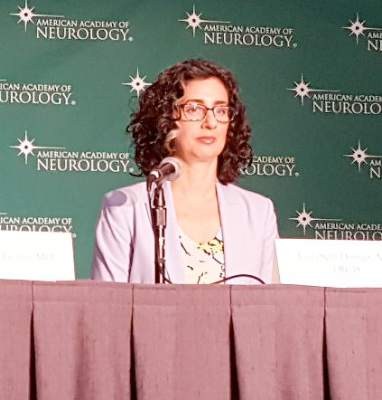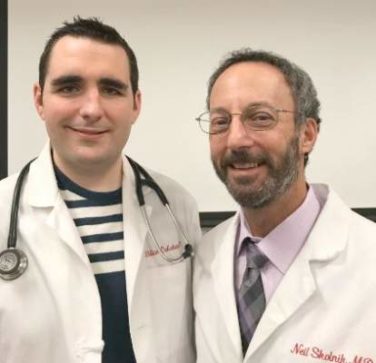AT AAN 2017
BOSTON (FRONTLINE MEDICAL NEWS) – Generalized tonic-clonic seizures (GTCS) are a major risk factor for sudden unexpected death in epilepsy (SUDEP), which underscores the importance of advising people with epilepsy about controlling such seizures, according to a new practice guideline from the American Academy of Neurology and the American Epilepsy Society.
Though SUDEP is rare, with an incidence rate of 0.22/1,000 patient-years in children with epilepsy and 1.2/1,000 patient-years in adults with epilepsy, the guideline committee found that people with three or more GTCS per year are 15 times more likely to die suddenly than are those without this seizure type. The risk increases with increasing GTCS frequency. This translates to an absolute risk of up to 18 deaths per 1,000 patient-years for people with epilepsy who have frequent GTCS.
“It is important that the rate of occurrence of SUDEP and the specific risk factors for SUDEP are communicated to persons and families affected by epilepsy,” lead guideline author, Cynthia L. Harden, MD , said during a press conference at the annual meeting of the American Academy of Neurology. “Our guideline brings clarity to the discussion, giving health care providers practical information they can use to help people with epilepsy reduce their risk.”
Specifically, the guideline recommends that health care providers should tell people with epilepsy that controlling seizures, especially GTCS, may reduce the risk of SUDEP, she said, adding that the guideline shows that “being free of seizures, particularly tonic-clonic seizures, is strongly associated with a decreased risk.”
“This guideline makes the conversation much easier with information that may motivate people to take their medications on time, to never skip taking their medications, and to learn and manage their seizure triggers so they can work toward reducing seizures. People who follow their medication schedule or pursue other treatments such as epilepsy surgery may be more likely to become seizure free,” said Dr. Harden, director of Epilepsy Services for the Mount Sinai Health System in New York.
Guideline coauthor, Elizabeth Donner, MD , added that, for this reason, the guideline recommends “that health professionals work with people who continue to have, specifically, these kind of seizures to try and reduce them with medications or with epilepsy surgery, actively weighing the risks and benefits of any new approach to seizure management.”
The recommendations are based on moderate (Level B) evidence.
The team also looked at numerous other risk factors for SUDEP and found that the strength of the evidence was too weak to support additional recommendations, said Dr. Donner, director of the comprehensive epilepsy program at The Hospital for Sick Children in Toronto and chair of the American Epilepsy Society SUDEP Task Force.
“More research is now needed to identify other preventable risk factors for SUDEP so that we can focus future studies on finding ways to reduce how often SUDEP occurs,” she added.
While the message regarding the importance of reducing seizure frequency is not new, it is important that this message be reiterated in the context of SUDEP, Dr. Donner said.
“It’s very important for it to be clear that the risk of frequent generalized tonic-clonic seizures – and we’re not talking about really frequent here; we’re talking about significant increased risk of death with only three per year – is not related only to maintaining a driver’s license, maintaining work, or other outcomes like that. It’s actually related to risk of death,” she said, noting that she hopes this is a motivator for pursuing treatments beyond medication when medication isn’t successful for treating seizures.
The guideline, which is endorsed by the International Child Neurology Association, is available online and in print ( Neurology. 2017;88:1674–80 ).
Dr. Harden receives royalties from Wiley and Up-to-Date. Dr. Donner has received research support from the Canadian Institutes of Health Research, Dravet Canada, and SUDEP Aware. Other guideline authors reported numerous disclosures, including many industry sources.





